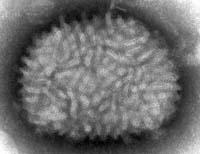Vaccinia virus: selfish, but also sociable

Along with preventing the introduction of new viruses into the infected cell, they discover that it helps spread the infection
When the Vaccinia virus infects a cell, it creates a structure that prevents the rest of the virus from infecting the same cell. Microbiologists have shown that this also has another consequence: it helps other viruses infect other cells. Therefore, the infection spreads faster than expected.
This was the basis for research by microbiologists at Imperial College London. The Vaccinia virus is very similar to what smallpox generates, but it does not cause diseases in humans. However, this similarity has been very useful in medicine, since it was used to create a vaccine against smallpox. And today they continue to investigate the virus in order to develop vaccines against other diseases.
Thus, London microbiologists realized that the virus spreads four times faster than expected based on its replication cycle. Continuing research, they found that vaccinia produces two proteins immediately after infecting a cell. These proteins create a structure on the cell surface that prevents other viruses from entering the same cell, that is, from preventing superinfection.
In fact, when other viruses reach that cell, another protein, actin, creates long arms through which they send viruses. This allows the infection to spread faster than otherwise.
The paper, published by researchers in the scientific journal Science, indicates that other viruses can use a similar strategy, such as conventional herpes viruses.





